11全国卷1英语试题
2011年英语听力(全国卷Ⅰ)听力真题+答案

2011年高考英语听力(全国1)试题第一节(共5小题:每小题1.5分,满分7.5分)1. What does the man like about the play?A. The story.B. The ending.C. The actor.2. Which place are the speakers trying to find?A. A hotel.B. A bank.C. A restaurant.3. At what time will the two speakers meet?A. 5:20.B. 5:10.C.4:40.4. What will the man do?A. Change the plan.B. Wait for a phone call.C. Sort things out.5. What does the woman want to do?A. See a film with the man.B. Offer the man some helpC. Listen to some great music.第二节(共15小题;每小题1 5分,满分22 .5分)听下面5段对话。
每段对话后有几个小题,从题中所给出的A、B、C三个选项种选出最佳选项,并标在试卷的相应位置。
听每段对话前,你将有时间阅读各个小题,每小题5秒钟;听完后,各小题给出5秒钟的作答时间。
每段对话读两遍。
听第6段材料,回答6、7题。
6. Where is Ben?A. In the kitchen.B. At school.C. In the park.7. What will the children in the afternoon?A. Help set the table.B. Have a party.C. Do their homework.听第7段材料,回答第8、9题8. What are the two speakers talking about?A. A Family holiday.B. A business trip.C. A travel plan.9. Where did Rachel go?A. Spain.B. Italy.C. China.听第8段材料,回答第10至12题。
2022年普通高等学校招生全国统一考试英语试题全国卷1-含答案

绝密★启封前 试卷类型A2022年普通高等学校招生全国统一考试(新课标I)英 语(考试时间:120分钟 试卷满分:150分)注意事项:1.本试卷由四个部份组成。
其中,第一、二部份和第三部份的第一节为选择题。
第三部份的第二节和第四部份为非选择题。
2.答卷前,考生务势必自己的姓名、准考证号填写在答题卡上。
3.回答选择题时,选出每小题答案后,用2B铅笔把答题卡上对应题目的答案标号涂黑;回答非选择题时,将答案写在答题卡上,写在本试卷上无效。
4.考试结束后,将本试卷和答题卡一并交回。
第一部份听力(共两节,满分30分)做题时,先将答案标在试卷上。
录音内容结束后,你将有两分钟的时间将试卷上的答案转涂到答题卡上。
第一节(共5小题;每小题1.5分,满分7.5分)听下面5段对话。
每段对话后有一个小题,从题中所给的A、B、C三个选项中选出最佳选项,并标在试卷的相应位置。
听完每段对话后,你都有10秒钟的时间来回答有关小题和阅读下一小题。
每段对话仅读一遍。
例:A. £ 19. 15.B. £ 9. 18.C. £ 9. 15.答案是C。
1.A.It’s amusing B.It’s excitingC.It’s disappointing2.A.Traveling aroundB.Studying at a schoolC.Looking after her aunt3.A.Going outB.Ordering drinksC.Preparing for a party4.A.In a classroomB.In a library C.In a bookstore5..A.Go on the InternetB.Make a phone callC.Take a train trip第二节(共15小题;每小题1.5分,满分22.5分)听下面5段对话或者独白。
每段对话或者独白后有几个小题,从题中所给的A、B、C三个选项中选出最佳选项,并标在试卷的相应位置。
2011全国卷一高考英语试题及答案
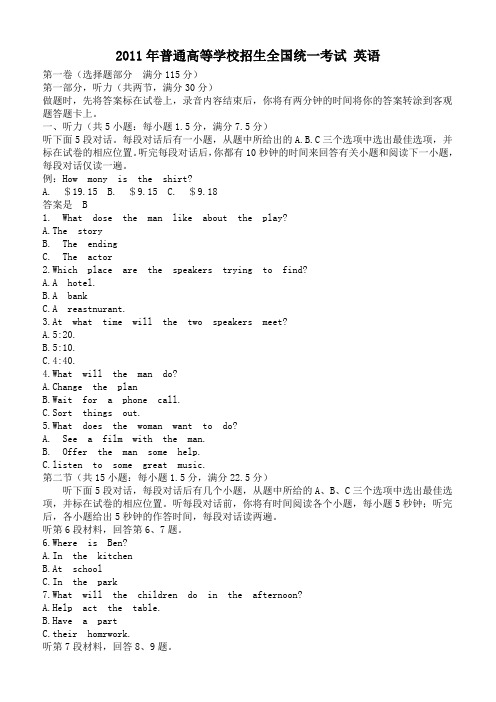
2011年普通高等学校招生全国统一考试英语第一卷(选择题部分满分115分)第一部分,听力(共两节,满分30分)做题时,先将答案标在试卷上,录音内容结束后,你将有两分钟的时间将你的答案转涂到客观题答题卡上。
一、听力(共5小题:每小题1.5分,满分7.5分)听下面5段对话。
每段对话后有一小题,从题中所给出的A.B.C三个选项中选出最佳选项,并标在试卷的相应位置。
听完每段对话后,你都有10秒钟的时间来回答有关小题和阅读下一小题,每段对话仅读一遍。
例:How mony is the shirt?A. $19.15B. $9.15C. $9.18答案是 B1. What dose the man like about the play?A.The storyB. The endingC. The actor2.Which place are the speakers trying to find?A.A hotel.B.A bankC.A reastnurant.3.At what time will the two speakers meet?A.5:20.B.5:10.C.4:40.4.What will the man do?A.Change the planB.Wait for a phone call.C.Sort things out.5.What does the woman want to do?A. See a film with the man.B. Offer the man some help.C.listen to some great music.第二节(共15小题:每小题1.5分,满分22.5分)听下面5段对话,每段对话后有几个小题,从题中所给的A、B、C三个选项中选出最佳选项,并标在试卷的相应位置。
听每段对话前,你将有时间阅读各个小题,每小题5秒钟;听完后,各小题给出5秒钟的作答时间,每段对话读两遍。
高考全国卷(新课标I)英语真题及答案解析
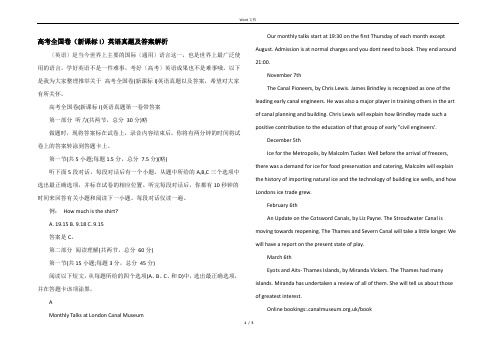
高考全国卷(新课标I)英语真题及答案解析〔英语〕是当今世界上主要的国际〔通用〕语言这一,也是世界上最广泛使用的语言。
学好英语不是一件难事,考好〔高考〕英语成果也不是难事哦。
以下是我为大家整理推举关于高考全国卷(新课标I)英语真题以及答案,希望对大家有所关怀。
高考全国卷(新课标I)英语真题第一卷带答案第一部分听力(共两节,总分30分)略做题时,现将答案标在试卷上,录音内容结束后,你将有两分钟的时间将试卷上的答案转涂到答题卡上。
第一节(共5小题;每题1.5分,总分7.5分)(略)听下面5段对话,每段对话后有一个小题。
从题中所给的A,B,C三个选项中选出最正确选项,并标在试卷的相应位置。
听完每段对话后,你都有10秒钟的时间来回答有关小题和阅读下一小题。
每段对话仅读一遍。
例:How much is the shirt?A. 19.15B. 9.18C. 9.15答案是C。
第二部分阅读理解(共两节,总分60分)第一节(共15小题;每题3分,总分45分)阅读以下短文,从每题所给的四个选项(A、B、C、和D)中,选出最正确选项,并在答题卡该项涂黑。
AMonthly Talks at London Canal MuseumOur monthly talks start at 19:30 on the first Thursday of each month except August. Admission is at normal charges and you dont need to book. They end around 21:00.November 7thThe Canal Pioneers, by Chris Lewis. James Brindley is recognized as one of the leading early canal engineers. He was also a major player in training others in the art of canal planning and building. Chris Lewis will explain how Brindley made such a positive contribution to the education of that group of early "civil engineers'.December 5thIce for the Metropolis, by Malcolm Tucker. Well before the arrival of freezers, there was a demand for ice for food preservation and catering, Malcolm will explain the history of importing natural ice and the technology of building ice wells, and how Londons ice trade grew.February 6thAn Update on the Cotsword Canals, by Liz Payne. The Stroudwater Canal is moving towards reopening. The Thames and Severn Canal will take a little longer. We will have a report on the present state of play.March 6thEyots and Aits- Thames Islands, by Miranda Vickers. The Thames had many islands. Miranda has undertaken a review of all of them. She will tell us about those of greatest interest.Online bookings:/bookMore into:/whatsonLondon Canal Museum12-13 New Wharf Road, London NI 9RT.canalmuseum.mobiTel:020 ********21. When is the talk on James Brindley?A. February 6th.B. March 6th.C. November 7th.D. December 5th.22. What is the topic of the talk in February?A. The Canal Pioneers.B. Ice for the MetropolisC. Eyots and Aits- Thames IslandsD. An Update on the Cotsword Canals23. Who will give the talk on the islands in the Thames.A. Miranda VickersB. Malcolm TuckerC. Chris LewisD. Liz Payne【答案】21. C22. D23. A【解析】试题分析:文章主要介绍了在伦敦运河博物馆每个月的讲座支配。
2011年全国高考英语试题及答案

2011 年普通高等学校招生全国统一考试(北京卷)英语本试卷共16 页,共150 分。
考试时长120 分钟。
考生务必将答案答在答题卡上,在试卷上作答无效。
考试结束后,将本试卷和答题卡一并交回。
第一部分:听力理解(共三节,30 分)第一节(共5 小题:每小题1.5 分,共7.5 分)听下面5 段对话。
每段对话后有一道小题,从每题所给的A、B、C 三个选项中选出最佳选项。
听完每段对话后,你将有10 秒钟的时间来回答有关小题和阅读下一小题。
每段对话你将听一遍。
例:What is the man going to read?A.A newspaper. B.A magazine. C.A book.答案是A。
1.What color T-shirt does the man plan to order?A.Red. B.Blue. C.Green.2.Which section does the man like to read?A.News. B.Sports. C.Entertainment.3.What job will the man probably take in summer?A.Lifeguard. B.Tour guide. C.Swimming coach.4.Where does the woman want to go on holiday?A.Turkey. B.Canada. C.Italy.5.What are the two speakers talking about?A.Shark. B.Camera. C.Movie.第二节(共10 小题:每小题1.5 分,共15 分)听下面4 段对话或独白。
每段对话或独白后有几道小题,从每题所给的A、B、C 三个选项中选出最佳选项。
听每段对话或独白前,你将有5 秒钟的时间阅读每小题。
听完后,每小题将给出5 秒钟的作答时间。
每段对话或独白你将听两遍。
2024年新课标全国Ⅰ卷 英语真题

2024年普通高等学校招生全国统一考试英语姓名________________ 准考证号________________全卷共12页,满分150分,考试时间120分钟。
考生注意:1. 答题前,请务必将自己的姓名、准考证号用黑色字迹的签字笔或钢笔分别填写在试题卷和答题纸规定的位置上。
2. 答题时,请按照答题纸上“注意事项”的要求,在答题纸相应的位置上规范作答,在本试题卷上的作答一律无效。
第一部分听力(共两节,满分30分)做题时,先将答案标在试卷上。
录音内容结束后,你将有两分钟的时间将试卷上的答案转涂到答题纸上。
第一节(共5小题;每小题1.5分,满分7.5分)听下面5段对话。
每段对话后有一个小题,从题中所给的A、B、C三个选项中选出最佳选项。
听完每段对话后,你都有10秒钟的时间来回答有关小题和阅读下一小题。
每段对话仅读一遍。
例:How much is the shirt?A. £19.15.B. £9.18.C. £9.15.答案是C。
1. 【此处可播放相关音频,请去附件查看】What is Kate doing?A. Boarding a flight.B. Arranging a trip.C. Seeing a friend off.2. 【此处可播放相关音频,请去附件查看】What are the speakers talking about?A. A pop star.B. An old song.C. A radio program.3. 【此处可播放相关音频,请去附件查看】What will the speakers do today?A. Go to an art show.B. Meet the man's aunt.C. Eat out with Mark.4. 【此处可播放相关音频,请去附件查看】What does the man want to do?A. Cancel an order.B. Ask for a receipt.C. Reschedule a delivery.5. 【此处可播放相关音频,请去附件查看】When will the next train to Bedford leave?A. At 9:45.B. At 10:15.C. At 11:00.第二节(共15小题;每小题1.5分,满分22.5分)听下面5段对话或独白。
2011年全国高考英语试题及答案-陕西卷
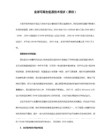
22.I__________through that bitter period without your generous help.
A. couldn't have gone B. didn't go
18. Jack,you seem in high spirits.
--____________We won the match 4-0.
A. Guess what? B. So what? C. No wonder. D. No doubt.
19.__________________all of them are strong candidates, only one will be chosen for the post.
第二节 情景对话(共5小题:每小题1分,满分5分)
根据对话情景和内容,从对话后所给的选项中选出能填入每一空白处的最佳选项,并在答题卡上将该选项涂黑。选项中有两个为多余选项。
Tom : Hi, Cathy. ___6___
Cathy: I have to finish my project on the history of the Internet. What about you?
17.The new stadium being built for the next Asian Games will be the present one.
A. as three times big as B. three times as big as
C. as big as three times D. as big three times as
2011年高考英语试题(全国新课标卷)答案
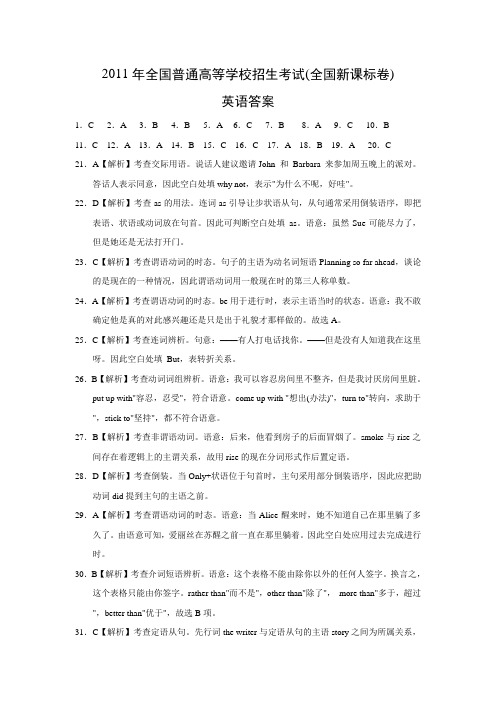
2011年全国普通高等学校招生考试(全国新课标卷)英语答案1.C 2.A 3.B 4.B 5.A 6.C 7.B 8.A 9.C 10.B11.C 12.A 13.A 14.B 15.C 16.C 17.A 18.B 19.A 20.C21.A【解析】考查交际用语。
说话人建议邀请John 和Barbara 来参加周五晚上的派对。
答话人表示同意,因此空白处填why not,表示"为什么不呢,好哇"。
22.D【解析】考查as的用法。
连词as引导让步状语从句,从句通常采用倒装语序,即把表语、状语或动词放在句首。
因此可判断空白处填as。
语意:虽然Sue可能尽力了,但是她还是无法打开门。
23.C【解析】考查谓语动词的时态。
句子的主语为动名词短语Planning so far ahead,谈论的是现在的一种情况,因此谓语动词用一般现在时的第三人称单数。
24.A【解析】考查谓语动词的时态。
be用于进行时,表示主语当时的状态。
语意:我不敢确定他是真的对此感兴趣还是只是出于礼貌才那样做的。
故选A。
25.C【解析】考查连词辨析。
句意:——有人打电话找你。
——但是没有人知道我在这里呀。
因此空白处填But,表转折关系。
26.B【解析】考查动词词组辨析。
语意:我可以容忍房间里不整齐,但是我讨厌房间里脏。
put up with"容忍,忍受",符合语意。
come up with "想出(办法)",turn to"转向,求助于",stick to"坚持",都不符合语意。
27.B【解析】考查非谓语动词。
语意:后来,他看到房子的后面冒烟了。
smoke与rise之间存在着逻辑上的主谓关系,故用rise的现在分词形式作后置定语。
28.D【解析】考查倒装。
当Only+状语位于句首时,主句采用部分倒装语序,因此应把助动词did提到主句的主语之前。
2011全国英语卷1(附答案)

2011年普通高等学校招生全国统一考试(全国卷1)第一部分英语知识运用(共三节,满分50分)第一节语音知识(共5小题;每小题1分,满分5分)从A, B, C, D四个选项中,找出其划线部分与所给单词的划线部分读音相同的选项,并在答题卡上将该项涂黑。
1. cushionA. buttonB. butcherC. buryD. duty2. countryA. announceB. coughC. encourageD. shoulder3. pillowA. flowerB. allowC. knowledgeD. follow4. reachA. breatheB. reallyC. pleasureD. heaven5. ChristmasA. handkerchiefB. teacherC. acheD. merchant第二节语法和词汇知识(共i5小题;每小题1分,满分15分)从A, B, C, D四个选项中,选出可以填入空白处的最佳选项,并在答题卡上将该项涂黑。
6. —Did you forget about my birthday?—, I‟ve booked a table at Michel‟s restaurant for this evening.A. What then?B. I‟m afraid so.C. how could I?D. For sure.7. Ted came for the weekend wearing only some shorts and a T-shirt, is a stupid thing to do in such weather.A. thisB. thatC. whatD. which8. If you smoke, please go outside.A. canB. shouldC. mustD. may9. If you don't like the drink you just leave it and try a different one.A. orderedB. are orderingC. will orderD. had ordered10. Mary, I John of his promise to help you.A. toldB. remindedC. warnedD. advised11. I got this bicycle for ; My friend gave it to me when she bought a new one.A. everythingB. somethingC. anythingD. nothing12. It is one thing to enjoy listening to good music, but it is another to play it well yourself.A. quiteB. veryC. ratherD. much13. Jane won‟t join us for dinner tonight and .A. neither won‟t TomB. Tom won‟t eitherC. Tom will tooD. so will Tom14. This shop will be closed for repairs further notice.A. withB. untilC. forD. at15. The island, to the mainland by a bridge, is easy to go to.A. joiningB. to joinC. joinedD. having joined16. As he reached front door, Jack saw strange sight.A. the; 不填B. a; theC. 不填; aD. the; a17. Mr. Stevenson is great to work for -- I really couldn't ask for a boss.A. betterB. goodC. bestD. still better18. Sarah pretended to be cheerful, nothing about the argument.A. saysB. saidC. to sayD. saying19. It was a nice meal, a little expensive.A. thoughB. whetherC. asD. since20. —So you gave her your phone?—, she said she'd return it to me when she could afford her own.A. My pleasureB. Not exactlyC. No doubtD. All right第三节完形填空(共20小题;每小题1.5分,满分30分)阅读下面短文,从短文后各题所给的四个选项(A, B, C和D)中,选出可以填入空白处的最佳选项飞并在答题卡上将该项涂黑。
2011年考研英语一试卷真题(后附答案详解)
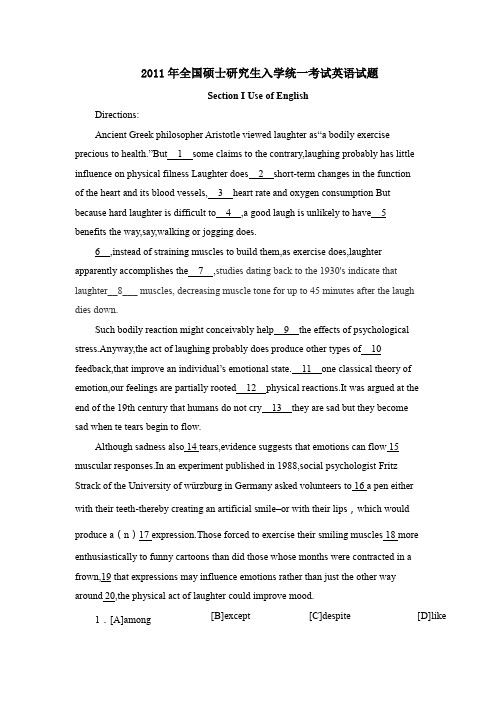
2011年全国硕士研究生入学统一考试英语试题Section I Use of EnglishDirections:Ancient Greek philosopher Aristotle viewed laughter as“a bodily exercise precious to health.”But 1 some claims to the contrary,laughing probably has little influence on physical filness Laughter does 2 short-term changes in the function of the heart and its blood vessels, 3 heart rate and oxygen consumption But because hard laughter is difficult to 4 ,a good laugh is unlikely to have 5 benefits the way,say,walking or jogging does.6 ,instead of straining muscles to build them,as exercise does,laughter apparently accomplishes the7 ,studies dating back to the 1930's indicate that laughter__8___ muscles, decreasing muscle tone for up to 45 minutes after the laugh dies down.Such bodily reaction might conceivably help 9 the effects of psychological stress.Anyway,the act of laughing probably does produce other types of 10 feedback,that improve an individual’s emotional state. 11 one classical theory of emotion,our feelings are partially rooted 12 physical reactions.It was argued at the end of the 19th century that humans do not cry 13 they are sad but they become sad when te tears begin to flow.Although sadness also 14 tears,evidence suggests that emotions can flow 15 muscular responses.In an experiment published in 1988,social psychologist Fritz Strack of the University of würzburg in Germany asked volunteers to 16 a pen either with their teeth-thereby creating an artificial smile–or with their lips,which would produce a(n)17 expression.Those forced to exercise their smiling muscles 18 more enthusiastically to funny cartoons than did those whose months were contracted in a frown,19 that expressions may influence emotions rather than just the other way around 20,the physical act of laughter could improve mood.Section II Reading ComprehensionPart ADirections:Read the following four texts.Answer the questions below each text bychoosing[A],[B],[C]or[D].Mark your answers on ANSWER SHEET 1.(40 points)Text 1The decision of the New York Philharmonic to hire Alan Gilbert as its next music director has been the talk of the classical-music world ever since the sudden announcement of his appointment in 2009.For the most part,the response has been favorable,to say the least.“Hooray!At last!”wrote Anthony Tommasini,a sober-sided classical-music critic.One of the reasons why the appointment came as such a surprise,however,is that Gilbert is comparatively little known.Even Tommasini,who had advocated Gilbert’s appointment in the Times,calls him“an unpretentious musician with no air of the formidable conductor about him.”As a description of the next music director of an orchestra that has hitherto been led by musicians like Gustav Mahler and Pierre Boulez,that seems likely to have struck at least some Times readers as faint praise.For my part,I have no idea whether Gilbert is a great conductor or even a good one.To be sure,he performs an impressive variety of interesting compositions,but it is not necessary for me to visit Avery Fisher Hall,or anywhere else,to hear interesting orchestral music.All I have to do is to go to my CD shelf,or boot up my computer and download still more recorded music from iTunes.Devoted concertgoers who reply that recordings are no substitute for live performance are missing the point.For the time,attention,and money of the art-loving public,classical instrumentalists must compete not only with opera houses,dance troupes,theater companies,and museums,but also with the recorded performances of the great classical musicians of the 20th century.There recordings are cheap,available everywhere,and very often much higher in artistic quality than today’s live performances;moreover,they can be“consumed”at a time and place of the listener’s choosing.The widespread availability of such recordings has thus brought about a crisis in the institution of the traditional classical concert.One possible response is for classical performers to program attractive new music that is not yet available on record.Gilbert’s own interest in new music has been widely noted:Alex Ross,a classical-music critic,has described him as a man who iscapable of turning the Philharmonic into“a markedly different,more vibrant organization.”But what will be the nature of that difference?Merely expanding the orchestra’s repertoire will not be enough.If Gilbert and the Philharmonic are to succeed,they must first change the relationship between America’s oldest orchestra and the new audience it hops to attract.21.We learn from Para.1 that Gilbert’s appointment has[A]incurred criticism.[B]raised suspicion.[C]received acclaim.[D]aroused curiosity.22.Tommasini regards Gilbert as an artist who is[A]influential.[B]modest.[C]respectable.[D]talented.23.The author believes that the devoted concertgoers[A]ignore the expenses of live performances.[B]reject most kinds of recorded performances.[C]exaggerate the variety of live performances.[D]overestimate the value of live performances.24.According to the text,which of the following is true of recordings?[A]They are often inferior to live concerts in quality.[B]They are easily accessible to the general public.[C]They help improve the quality of music.[D]They have only covered masterpieces.25.Regarding Gilbert’s role in revitalizing the Philharmonic,the author feels[A]doubtful.[B]enthusiastic.[C]confident.[D]puzzled.Text 2When Liam McGee departed as president of Bank of America in August,his explanation was surprisingly straight up.Rather than cloaking his exit in the usual vague excuses,he came right out and said he was leaving“to pursue my goal of running a company.”Broadcasting his ambition was“very much my decision,”McGee says.Within two weeks,he was talking for the first time with the board of Hartford Financial Services Group,which named him CEO and chairman on September 29.McGee says leaving without a position lined up gave him time to reflect on whatkind of company he wanted to run.It also sent a clear message to the outside world about his aspirations.And McGee isn’t alone.In recent weeks the No.2 executives at Avon and American Express quit with the explanation that they were looking for a CEO post.As boards scrutinize succession plans in response to shareholder pressure,executives who don’t get the nod also may wish to move on.A turbulent business environment also has senior managers cautious of letting vague pronouncements cloud their reputations.As the first signs of recovery begin to take hold,deputy chiefs may be more willing to make the jump without a net.In the third quarter,CEO turnover was down 23%from a year ago as nervous boards stuck with the leaders they had,according to Liberum Research.As the economy picks up,opportunities will abound for aspiring leaders.The decision to quit a senior position to look for a better one is unconventional.For years executives and headhunters have adhered to the rule that the most attractive CEO candidates are the ones who must be poached.Says Korn/Ferry senior partner Dennis Carey:”I can’t think of a single search I’ve done where a board has not instructed me to look at sitting CEOs first.”Those who jumped without a job haven’t always landed in top positions quickly.Ellen Marram quit as chief of Tropicana a decade age,saying she wanted to be a CEO.It was a year before she became head of a tiny Internet-based commodities exchange.Robert Willumstad left Citigroup in 2005 with ambitions to be a CEO.He finally took that post at a major financial institution three years later.Many recruiters say the old disgrace is fading for top performers.The financial crisis has made it more acceptable to be between jobs or to leave a bad one.“The traditional rule was it’s safer to stay where you are,but that’s been fundamentally inverted,”says one headhunter.“The people who’ve been hurt the worst are those who’ve stayed too long.”26.When McGee announced his departure,his manner can best be described as being[A]arrogant.[B]frank.[C]self-centered.[D]impulsive.27.According to Paragraph 2,senior executives’ quitting may be spurred by[A]their expectation of better financial status.[B]their need to reflect on their private life.[C]their strained relations with the boards.[D]their pursuit of new career goals.28.The word“poached”(Line 3,Paragraph 4)most probably means[A]approved of.[B]attended to.[C]hunted for.[D]guarded against.29.It can be inferred from the last paragraph that[A]top performers used to cling to their posts.[B]loyalty of top performers is getting out-dated.[C]top performers care more about reputations.[D]it’s safer to stick to the traditional rules.30.Which of the following is the best title for the text?[A]CEOs:Where to Go? [B]CEOs:All the Way Up?[C]Top Managers Jump without a Net [D]The Only Way Out for Top PerformersText 3The rough guide to marketing success used to be that you got what you paid for.No longer.While traditional“paid”media–such as television commercials and print advertisements–still play a major role,companies today can exploit many alternative forms of media.Consumers passionate about a product may create“owned”media by sending e-mail alerts about products and sales to customers registered with its Web site.The way consumers now approach the broad range of factors beyond conventional paid media.Paid and owned media are controlled by marketers promoting their own products.For earned media,such marketers act as the initiator for users’ responses.But in some cases,one marketer’s owned media become another marketer’s paid media–for instance,when an e-commerce retailer sells ad space on its Web site.We define such sold media as owned media whose traffic is so strong that other organizations place their content or e-commerce engines within that environment.This trend,which we believe is still in its infancy,effectively began with retailers and travel providers such as airlines and hotels and will no doubt go further.Johnson&Johnson,forexample,has created Baby Center,a stand-alone media property that promotes complementary and even competitive products.Besides generating income,the presence of other marketers makes the site seem objective,gives companies opportunities to learn valuable information about the appeal of other companies’ marketing,and may help expand user traffic for all companies concerned.The same dramatic technological changes that have provided marketers with more(and more diverse)communications choices have also increased the risk that passionate consumers will voice their opinions in quicker,more visible,and much more damaging ways.Such hijacked media are the opposite of earned media:an asset or campaign becomes hostage to consumers,other stakeholders,or activists who make negative allegations about a brand or product.Members of social networks,for instance,are learning that they can hijack media to apply pressure on the businesses that originally created them.If that happens,passionate consumers would try to persuade others to boycott products,putting the reputation of the target company at risk.In such a case,the company’s response may not be sufficiently quick or thoughtful,and the learning curve has been steep.Toyota Motor,for example,alleviated some of the damage from its recall crisis earlier this year with a relatively quick and well-orchestratedsocial-media response campaign,which included efforts to engage with consumers directly on sites such as Twitter and the social-news site Digg.31.Consumers may create“earned”media when they are[A]obsessed with online shopping at certain Web sites.[B]inspired by product-promoting e-mails sent to them.[C]eager to help their friends promote quality products.[D]enthusiastic about recommending their favorite products.32.According to Paragraph 2,sold media feature[A]a safe business environment.[B]random competition.[C]strong user traffic.[D]flexibility in organization.33.The author indicates in Paragraph 3 that earned media[A]invite constant conflicts with passionate consumers.[B]can be used to produce negative effects in marketing.[C]may be responsible for fiercer competition.[D]deserve all the negative comments about them.34.Toyota Motor’s experience is cited as an example of[A]responding effectively to hijacked media.[B]persuading customers into boycotting products.[C]cooperating with supportive consumers.[D]taking advantage of hijacked media.35.Which of the following is the text mainly about?[A]Alternatives to conventional paid media.[B]Conflict between hijacked and earned media.[C]Dominance of hijacked media.[D]Popularity of owned media.Text 4It’s no surprise that Jennifer Senior’s insightful,provocative magazine cover story,“I love My Children,I Hate My Life,”is arousing much chatter–nothing gets people talking like the suggestion that child rearing is anything less than a completely fulfilling,life-enriching experience.Rather than concluding that children make parents either happy or miserable,Senior suggests we need to redefine happiness:instead of thinking of it as something that can be measured by moment-to-moment joy,we should consider being happy as a past-tense condition.Even though the day-to-day experience of raising kids can be soul-crushingly hard,Senior writes that“the very things that in the moment dampen our moods can later be sources of intense gratification and delight.”The magazine cover showing an attractive mother holding a cute baby is hardly the only Madonna-and-child image on newsstands this week.There are also stories about newly adoptive–and newly single–mom Sandra Bullock,as well as theusual“Jennifer Aniston is pregnant”news.Practically every week features at least one celebrity mom,or mom-to-be,smiling on the newsstands.In a society that so persistently celebrates procreation,is it any wonder that admitting you regret having children is equivalent to admitting you supportkitten-killing?It doesn’t seem quite fair,then,to compare the regrets of parents to the regrets of the children.Unhappy parents rarely are provoked to wonder if they shouldn’t have had kids,but unhappy childless folks are bothered with the message that children are the single most important thing in the world:obviously their misery must be a direct result of the gaping baby-size holes in their lives.Of course,the image of parenthood that celebrity magazines like Us Weekly and People present is hugely unrealistic,especially when the parents are single mothers like Bullock.According to several studies concluding that parents are less happy than childless couples,single parents are the least happy of all.No shock there,considering how much work it is to raise a kid without a partner to lean on;yet to hear Sandra and Britney tell it,raising a kid on their“own”(read:with round-the-clock help)is a piece of cake.It’s hard to imagine that many people are dumb enough to want children just because Reese and Angelina make it look so glamorous:most adults understand that a baby is not a haircut.But it’s interesting to wonder if the images we see every week of stress-free,happiness-enhancing parenthood aren’t in some small,subconscious way contributing to our own dissatisfactions with the actual experience,in the same way that a small part of us hoped getting“the Rachel”might make us look just a little bit like Jennifer Aniston.36.Jennifer Senior suggests in her article that raising a child can bring[A]temporary delight[B]enjoyment in progress[C]happiness in retrospect[D]lasting reward37.We learn from Paragraph 2 that[A]celebrity moms are a permanent source for gossip.[B]single mothers with babies deserve greater attention.[C]news about pregnant celebrities is entertaining.[D]having children is highly valued by the public.38.It is suggested in Paragraph 3 that childless folks[A]are constantly exposed to criticism.[B]are largely ignored by the media.[C]fail to fulfill their social responsibilities.[D]are less likely to be satisfied withtheir life.39.According to Paragraph 4,the message conveyed by celebrity magazines is[A]soothing.[B]ambiguous.[C]compensatory.[D]misleading.40.Which of the following can be inferred from the last paragraph?[A]Having children contributes little to the glamour of celebrity moms.[B]Celebrity moms have influenced our attitude towards child rearing.[C]Having children intensifies our dissatisfaction with life.[D]We sometimes neglect the happiness from child rearing.Part BDirections:The following paragraph are given in a wrong order.For Questions 41-45,you are required to reorganize these paragraphs into a coherent text by choosing from the list A-G to filling them into the numbered boxes.Paragraphs E and G have been correctly placed.Mark your answers on ANSWER SHEET 1.(10 points)[A]No disciplines have seized on professionalism with as much enthusiasm as the humanities.You can,Mr Menand points out,became a lawyer in three years and a medical doctor in four.But the regular time it takes to get a doctoral degree in the humanities is nine years.Not surprisingly,up to half of all doctoral students in English drop out before getting their degrees.[B]His concern is mainly with the humanities:Literature,languages,philosophy and so on.These are disciplines that are going out of style:22%of American college graduates now major in business compared with only 2%in history and 4%in English.However,many leading American universities want their undergraduates to have a grounding in the basic canon of ideas that every educated person should posses.But most find it difficult to agree on what a“general education”should look like.At Harvard,Mr Menand notes,“the great books are read because they have been read”-they form a sort of social glue.[C]Equally unsurprisingly,only about half end up with professorships for which they entered graduate school.There are simply too few posts.This is partly because universities continue to produce ever more PhDs.But fewer students want to studyhumanities subjects:English departments awarded more bachelor’s degrees in 1970-71 than they did 20 years later.Fewer students requires fewer teachers.So,at the end of a decade of theses-writing,many humanities students leave the profession to do something for which they have not been trained.[D]One reason why it is hard to design and teach such courses is that they can cut across the insistence by top American universities that liberal-arts educations and professional education should be kept separate,taught in different schools.Many students experience both varieties.Although more than half of Harvard undergraduates end up in law,medicine or business,future doctors and lawyers must study anon-specialist liberal-arts degree before embarking on a professional qualification.[E]Besides professionalizing the professions by this separation,top American universities have professionalised the professor.The growth in public money for academic research has speeded the process:federal research grants rose fourfold between 1960and 1990,but faculty teaching hours fell by half as research took its toll.Professionalism has turned the acquisition of a doctoral degree into a prerequisite for a successful academic career:as late as 1969a third of American professors did not possess one.But the key idea behind professionalisation,argues Mr Menand,is that“the knowledge and skills needed for a particular specialization are transmissible but not transferable.”So disciplines acquire a monopoly not just over the production of knowledge,but also over the production of the producers of knowledge.[F]The key to reforming higher education,concludes Mr Menand,is to alter the way in which“the producers of knowledge are produced.”Otherwise,academics will continue to think dangerously alike,increasingly detached from the societies which they study,investigate and criticize.”Academic inquiry,at least in some fields,may need to become less exclusionary and more holistic.”Yet quite how that happens,Mr Menand dose not say.[G]The subtle and intelligent little book The Marketplace of Ideas:Reform and Resistance in the American University should be read by every student thinking of applying to take a doctoral degree.They may then decide to go elsewhere.For something curious has been happening in American Universities,and Louis Menand,aprofessor of English at Harvard University,captured it skillfully.G→41.→42.→E→43.→44.→45.Part CDirections:Read the following text carefully and then translate the underlined segments into Chinese.Your translation should be written carefully on ANSWER SHEET 2.(10 points)With its theme that“Mind is the master weaver,”creating our inner character and outer circumstances,the book As a Man Thinking by James Allen is an in-depth exploration of the central idea of self-help writing.(46)Allen’s contribution was to take an assumption we all share-that because we are not robots we therefore control our thoughts-and reveal its erroneousnature.Because most of us believe that mind is separate from matter,we think that thoughts can be hidden and made powerless;this allows us to think one way and act another.However,Allen believed that the unconscious mind generates as much action as the conscious mind,and(47)while we may be able to sustain the illusion of control through the conscious mind alone,in reality we are continually faced with a question:“Why cannot I make myself do this or achieve that?”Since desire and will are damaged by the presence of thoughts that do not accord with desire,Allen concluded:“We do not attract what we want,but what weare.”Achievement happens because you as a person embody the external achievement;you don’t“get”success but become it.There is no gap between mind and matter.Part of the fame of Allen’s book is its contention that“Circumstances do not make a person,they reveal him.”(48)This seems a justification for neglect of those in need,and a rationalization of exploitation,of the superiority of those at the top and the inferiority of those at the bottom.This,however,would be a knee-jerk reaction to a subtle argument.Each set of circumstances,however bad,offers a unique opportunity for growth.If circumstances always determined the life and prospects of people,then humanity would never haveprogressed.In fat,(49)circumstances seem to be designed to bring out the best in us and if we fel that we have been“wronged”then we are unlikely to begin a conscious effort to escape from oure situation.Nevertheless,as any biographer knows,a person’s early life and its conditions are often the greatest gift to an individual.The sobering aspect of Allen’s book is that we have no one else to blame for our present condition except ourselves.(50)The upside is the possibilities contained in knowing that everything is up to us;where before we were experts in the array of limitations,now we become authorities of what is possible.SectionⅢWritingPart A51.Directions:Write a letter to a friend of yours to1)recommend one of your favorite movies and2)give reasons for your recommendationYour should write about 100 words on ANSWER SHEET 2Do not sign your own name at the end of the er“LI MING”instead.Do not writer the address.(10 points)Part B52.Directions:Write an essay of 160---200 words based on the following drawing.In your essay,you should1)describe the drawing briefly,2)explain it’s intended meaning,and3)give your comments.Your should write neatly on ANSWER SHEET 2.(20 points)答案解析Section I Use of English1.【答案】[C]【解析】语义逻辑题。
2001--2011年全国高考英语全国卷1含答案.

2001普通高等学校招生全国统一考试英语试题英语试题第一部分:听力(共两节,满分20分题时,先将答案划在试卷上。
录音内容结束后,你将有两分钟的时间将试卷上的答案转涂到答题卡上。
第一节(共5小题;每小题1分,满分5分听下面5段对话。
每段对话后有一个小题,从题中所给的A、B、C 三个选项中选出最佳选项,并标在试卷的相应位置。
听完每段对话后,你都有10秒钟的时间来回答有关小题和阅读下一小题。
每段对话仅读一遍。
例:How much is the shirt?A. £19.15.B. £9.15.C. £9.18.答案是B1. Where did this conversation most probably take place?A. At a concert.B. At a flower shop.C. At a restaurant.2. What did Paul do this morning?A. He had a history lesson.B. He had a chemistry lesson.C. He attended a meeting.3. What can we learn about the man from the conversation?A. He's anxious to see his sister.B. He wrote to his sister last month.C. He's expecting a letter from his sister.4. At what time does the train to Leeds leave?A.3:00.B.3:15.C.5:00.5. What is the man's problem?A. He can't decide how to go.B. He can't drive himself.C. He doesn't like travelling by train.第二节(共15小题;每小题1分,满分15分听下面5段对话或独白。
英语全国1卷试题及答案
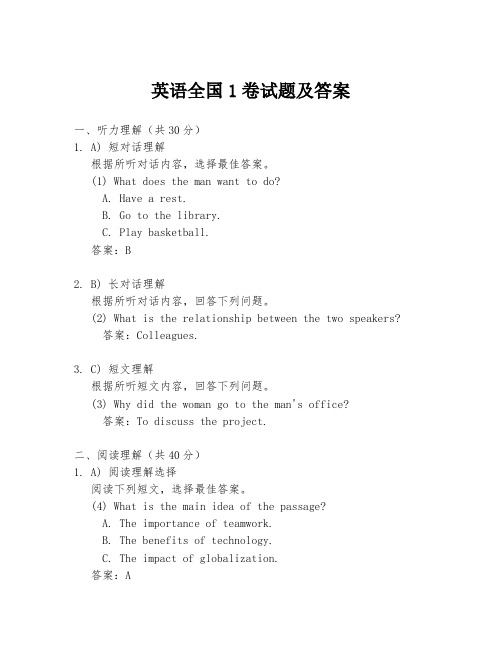
英语全国1卷试题及答案一、听力理解(共30分)1. A) 短对话理解根据所听对话内容,选择最佳答案。
(1) What does the man want to do?A. Have a rest.B. Go to the library.C. Play basketball.答案:B2. B) 长对话理解根据所听对话内容,回答下列问题。
(2) What is the relationship between the two speakers?答案:Colleagues.3. C) 短文理解根据所听短文内容,回答下列问题。
(3) Why did the woman go to the man's office?答案:To discuss the project.二、阅读理解(共40分)1. A) 阅读理解选择阅读下列短文,选择最佳答案。
(4) What is the main idea of the passage?A. The importance of teamwork.B. The benefits of technology.C. The impact of globalization.答案:A2. B) 阅读理解填空阅读下列短文,从所给选项中选出合适的词或短语填空。
(5) The author suggests that _______ is the key to success.答案:innovation3. C) 阅读理解匹配阅读下列短文,将信息与相应的选项匹配。
(6) The first paragraph is mainly about _______.A. The history of the company.B. The company's achievements.C. The company's challenges.答案:C三、完形填空(共20分)阅读下列短文,从所给选项中选出最佳答案填空。
2011年高考试题——英语(全国卷)解析版
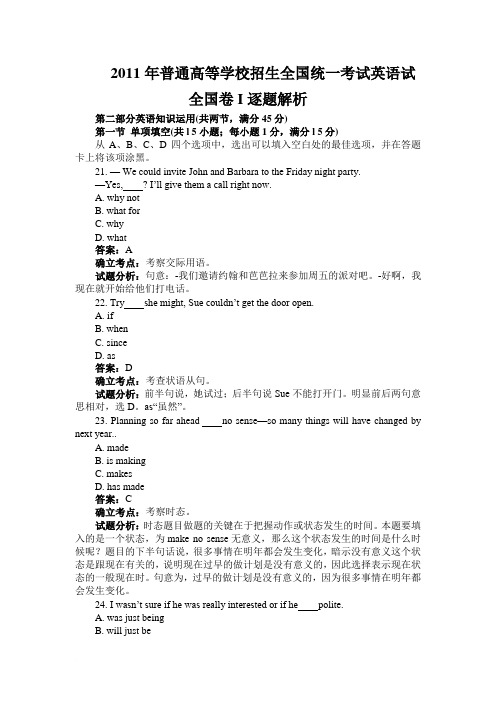
2011年普通高等学校招生全国统一考试英语试全国卷I逐题解析第二部分英语知识运用(共两节,满分45分)第一节单项填空(共l 5小题;每小题1分,满分l 5分)从A、B、C、D四个选项中,选出可以填入空白处的最佳选项,并在答题卡上将该项涂黑。
21. — We could invite John and Barbara to the Friday night party.—Yes, ? I’ll give them a call right now.A. why notB. what forC. whyD. what答案:A确立考点:考察交际用语。
试题分析:句意:-我们邀请约翰和芭芭拉来参加周五的派对吧。
-好啊,我现在就开始给他们打电话。
22. Try she might, Sue couldn’t get the door open.A. ifB. whenC. sinceD. as答案:D确立考点:考查状语从句。
试题分析:前半句说,她试过;后半句说Sue不能打开门。
明显前后两句意思相对,选D。
as“虽然”。
23. Planning so far ahead no sense—so many things will have changed by next year..A. madeB. is makingC. makesD. has made答案:C确立考点:考察时态。
试题分析:时态题目做题的关键在于把握动作或状态发生的时间。
本题要填入的是一个状态,为make no sense无意义,那么这个状态发生的时间是什么时候呢?题目的下半句话说,很多事情在明年都会发生变化,暗示没有意义这个状态是跟现在有关的,说明现在过早的做计划是没有意义的,因此选择表示现在状态的一般现在时。
句意为,过早的做计划是没有意义的,因为很多事情在明年都会发生变化。
24. I wasn’t sure if he was really interested or if he polite.A. was just beingB. will just beC. had just beenD. would just be答案:A确立考点:考察时态及连词用法。
2011年高考英语全国一卷试题及答案
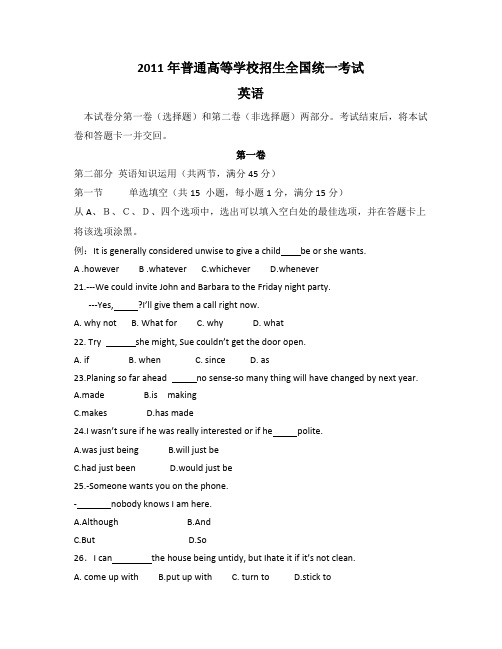
2011年普通高等学校招生全国统一考试英语本试卷分第一卷(选择题)和第二卷(非选择题)两部分。
考试结束后,将本试卷和答题卡一并交回。
第一卷第二部分英语知识运用(共两节,满分45分)第一节单选填空(共15 小题,每小题1分,满分15分)从A、B、C、D、四个选项中,选出可以填入空白处的最佳选项,并在答题卡上将该选项涂黑。
例:It is generally considered unwise to give a child be or she wants.A .howeverB .whatever C.whichever D.whenever21.---We could invite John and Barbara to the Friday night party.---Yes, ?I’ll give them a call right now.A. why notB. What forC. whyD. what22. Try she might, Sue couldn’t get the door open.A. ifB. whenC. sinceD. as23.Planing so far ahead no sense-so many thing will have changed by next year.A.madeB.is makingC.makesD.has made24.I wasn’t sure if he was really interested or if he polite.A.was just beingB.will just beC.had just beenD.would just be25.-Someone wants you on the phone.- nobody knows I am here.A.AlthoughB.AndC.ButD.So26.I can the house being untidy, but Ihate it if it’s not clean.A. come up withB.put up withC. turn toD.stick to27.The next thing he saw was smoke from behind the house.A.roseB.risingC. to riseD.risen28.Only when he reached the tea-house it was the same place he’d been in last year.A. he realizedB.he did realizeC.realized heD.did he realize29.When Alice came to, she did not know how long she there.A.had been lyingB.has been lyingC.was lyingD.has lain30.The form cannot be signed by anyone yourself.A.rather thanB.other thanC.more thanD.better than31.The prize will go to the writer story shows the most imagination.A.thatB.whichC.whoseD.what32.They have arrived at lunchtime but their flight was delayed.A.willB.canC.mustD.should33.It is generally accepted that boy must learn to stand up and fight like man.A.a;aB.a;theC.the;theD.a;不填34.William found it increasingly difficult to read, for his eyesight was beginning to . A.disappear B.fall C.fail D.damage35.—Artistic people can be very difficult sometimes.—Well, you married one. .A.You name itB.I’ve got itC.I can’t agree moreD.You should know第二节完形填空(共20小题:每小题1.5分,满分30分)阅读下面的短文,从短文后各题所给的四个选项(A、B、C和D)中,选出可以填入空白处的最佳选项,并在答题卡上将该项涂黑。
2011年全国高考英语试题及答案-广东卷
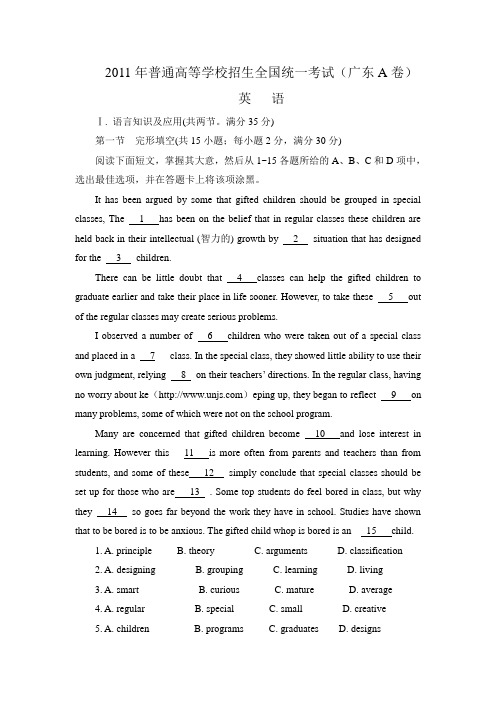
2011年普通高等学校招生全国统一考试(广东A卷)英语Ⅰ. 语言知识及应用(共两节。
满分35分)第一节完形填空(共15小题;每小题2分,满分30分)阅读下面短文,掌握其大意,然后从1~15各题所给的A、B、C和D项中,选出最佳选项,并在答题卡上将该项涂黑。
It has been argued by some that gifted children should be grouped in special classes, The 1 has been on the belief that in regular classes these children are held back in their intellectual (智力的) growth by 2 situation that has designed for the 3 children.There can be little doubt that 4 classes can help the gifted children to graduate earlier and take their place in life sooner. However, to take these 5 out of the regular classes may create serious problems.I observed a number of 6 children who were taken out of a special class and placed in a 7 class. In the special class, they showed little ability to use their own judgment, relying 8 on their teachers’ directions. In the regular class, having no worry about ke()eping up, they began to reflect 9 on many problems, some of which were not on the school program.Many are concerned that gifted children become 10 and lose interest in learning. However this 11 is more often from parents and teachers than from students, and some of these 12 simply conclude that special classes should be set up for those who are 13 . Some top students do feel bored in class, but why they 14 so goes far beyond the work they have in school. Studies have shown that to be bored is to be anxious. The gifted child whop is bored is an 15 child.1. A. principle B. theory C. arguments D. classification2. A. designing B. grouping C. learning D. living3. A. smart B. curious C. mature D. average4. A. regular B. special C. small D. creative5. A. children B. programs C. graduates D. designs6. A. intelligent B. competent C. ordinary D. independent7. A. separate B. regular C. new D. boring8. A. specially B. slightly C. wrongly D. heavily9. A, directly B. cleverly C. voluntarily D. quickly10. A. doubted B. bored C. worried D. tired11. A. concern B. conclusion C. reflection D. interest12. A. students B. adults C. scholars D. teachers13. A. talented B. worried C. learned D. interested14. A. believe B. think C. say D. feel15. A. outstanding B. intelligent C. anxious D. ordinary第二节语法填空(共10小题;每小题1.5分,满分15分)阅读下面短文,按照句子结构的语法性和上下文连贯的要求,在空格处填入一个适当的词或使用括号中词语的正确形式填空,并将答案填写在答题卡标号为16~25的相应位置上。
2011年上海高考英语试题含答案
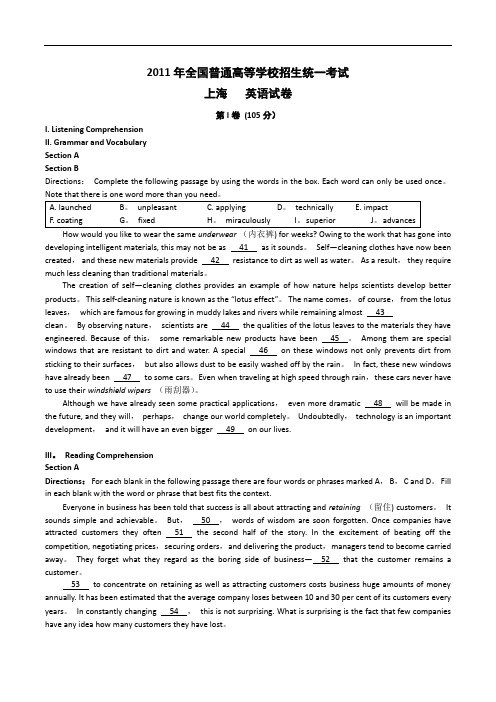
2011年全国普通高等学校招生统一考试上海英语试卷第I卷(105分)I. Listening ComprehensionII. Grammar and VocabularySection ASection BDirections:Complete the following passage by using the words in the box. Each word can only be used once。
Note that there is one word more than you need。
A. launched B。
unpleasant C. applying D。
technically E. impactF. coating G。
fixed H。
miraculously I。
superior J。
advancesHow would you like to wear the same underwear(内衣裤) for weeks? Owing to the work that has gone into developing intelligent materials, this may not be as 41 as it sounds。
Self—cleaning clothes have now been created,and these new materials provide 42 resistance to dirt as well as water。
As a result,they require much less cleaning than traditional materials。
The creation of self—cleaning clothes provides an example of how nature helps scientists develop better products。
2023年普通高等学校招生全国统一考试英语试题及答案(新课标全国1卷)

2023年普通高等学校招生全国统一考试(新课标全国Ⅰ卷)英语学科本试卷共12页。
考试结束后, 将本试卷和答题卡一并交回。
注意事项:1. 答题前, 考生先将自己的姓名、准考证号码填写清楚, 将条形码准确粘贴在考生信息条形码粘贴区。
2. 选择题必须使用2B铅笔填涂; 非选择题必须使用0.5毫米黑色字迹的签字笔书写, 字体工整、笔迹清楚。
3. 请按照题号顺序在答题卡各题目的答题区域内作答, 超出答题区域书写的答案无效; 在草稿纸、试卷上答题无效。
4. 作图可先使用铅笔画出, 确定后必须用黑色字迹的签字笔描黑。
5. 保持卡面清洁, 不要折叠, 不要弄破、弄皱, 不准使用涂改液、修正带、刮纸刀。
第一部分听力(1-20小题)在笔试结束后进行。
(共5小题; 每小题1.5分, 满分7.5分)听下面5段对话。
每段对话后有一个小题, 从题中所给的A、B、C三个选项中选出最佳选项。
听完每段对话后, 你都有10秒钟的时间来回答有关小题和阅读下一小题。
每段对话仅读一遍。
例: How much is the shirt?A. £19.15.B. £9.18.C. £9.15.答案是C。
1. What will Jack probably do this weekend?A. Go camping.B. Visit a friend.C. Watch a film.2.What does the woman ask the man to do?A. Take care of her bags.B. Pack the food for her.C. Check the train schedule.3. When will the man see Bob?A. This Friday.B. This Saturday.C. Next Monday.4. Why does the man apologize?A. For the terrible food.B. For the overcharge.C. For the waiter’s rudeness.5. What are the speakers talking about?A Writing a book. B. Holding a celebration. C. Buying a present.第二节(共15小题; 每小题1.5分, 满分22.5分)听下面一段较长对话,回答以下小题。
普通高等学校招生全国统一考试英语试题(全国卷,解析版)
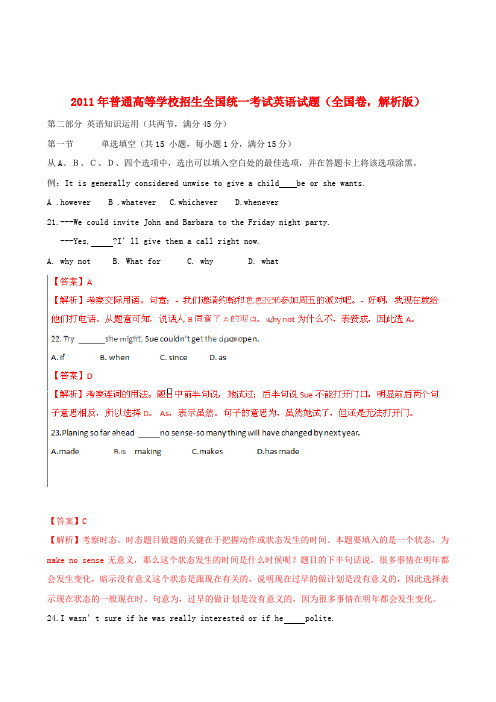
2011年普通高等学校招生全国统一考试英语试题(全国卷,解析版)第二部分英语知识运用(共两节,满分45分)第一节单选填空(共15 小题,每小题1分,满分15分)从A、B、C、D、四个选项中,选出可以填入空白处的最佳选项,并在答题卡上将该选项涂黑。
例:It is generally considered unwise to give a child be or she wants.A .howeverB .whatever C.whichever D.whenever21.---We could invite John and Barbara to the Friday night party.---Yes, ?I’ll give them a call right now.A. why notB. What forC. whyD. what【答案】C【解析】考察时态。
时态题目做题的关键在于把握动作或状态发生的时间。
本题要填入的是一个状态,为make no sense无意义,那么这个状态发生的时间是什么时候呢?题目的下半句话说,很多事情在明年都会发生变化,暗示没有意义这个状态是跟现在有关的,说明现在过早的做计划是没有意义的,因此选择表示现在状态的一般现在时。
句意为,过早的做计划是没有意义的,因为很多事情在明年都会发生变化。
24.I wasn’t sure if he was really interested or if he polite.A.was just beingB.will just beC.had just beenD.would just be25.-Someone wants you on the phone.- nobody knows I am here.A.AlthoughB.AndC.ButD.So27.The next thing he saw was smoke from behind the house.A.roseB.risingC. to riseD.risen29.When Alice came to, she did not know how long she there.A.had been lyingB.has been lyingC.was lyingD.has lain【答案】A32.They have arrived at lunchtime but their flight was delayed.A.willB.canC.mustD.should【答案】D【解析】考察情态动词。
2011年高考北京卷英语试题(附答案)
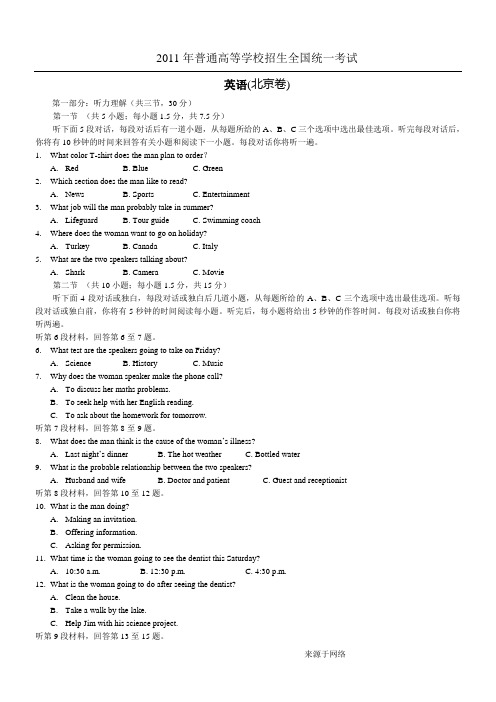
2011年普通高等学校招生全国统一考试英语(北京卷)第一部分:听力理解(共三节,30分)第一节(共5小题;每小题1.5分,共7.5分)听下面5段对话,每段对话后有一道小题,从每题所给的A、B、C三个选项中选出最佳选项。
听完每段对话后,你将有10秒钟的时间来回答有关小题和阅读下一小题。
每段对话你将听一遍。
1.What color T-shirt does the man plan to order?A.RedB. BlueC. Green2.Which section does the man like to read?A.3.A.4.A.5.A.听两遍。
听第66.A.7.A.B.C.听第78.A.9.A.听第810.A.Making an invitation.B.Offering information.C.Asking for permission.11.What time is the woman going to see the dentist this Saturday?A.10:30 a.m.B. 12:30 p.m.C. 4:30 p.m.12.What is the woman going to do after seeing the dentist?A.Clean the house.B.Take a walk by the lake.C.Help Jim with his science project.听第9段材料,回答第13至15题。
13.What makes shoppers tired?A.Queuing for electrically-driven cars.B.Looking for what they want to buy.C.Carrying shopping around.14.What is the problem for building moving walkways in the store?A.The spaceB. The redesignC. The technology15.Where will the computer system send the things shoppers buy?A.To the exit.B.To the shelf.C.To the shoppers’ homes.第三节(共5小题;每小题15分,共75分)第二部分,如识运用(共两题)45分。
- 1、下载文档前请自行甄别文档内容的完整性,平台不提供额外的编辑、内容补充、找答案等附加服务。
- 2、"仅部分预览"的文档,不可在线预览部分如存在完整性等问题,可反馈申请退款(可完整预览的文档不适用该条件!)。
- 3、如文档侵犯您的权益,请联系客服反馈,我们会尽快为您处理(人工客服工作时间:9:00-18:30)。
